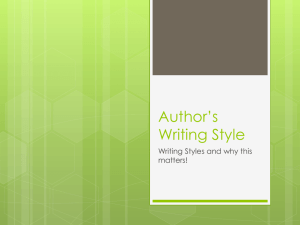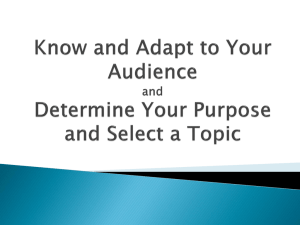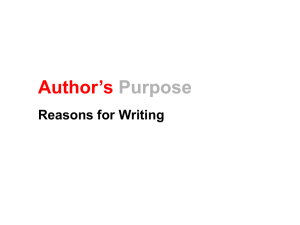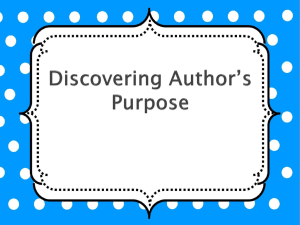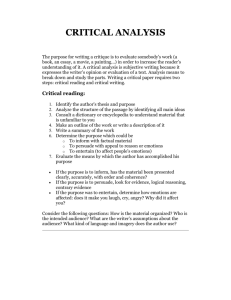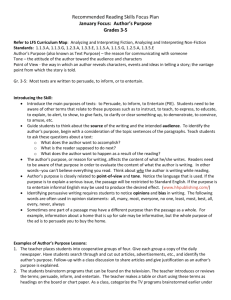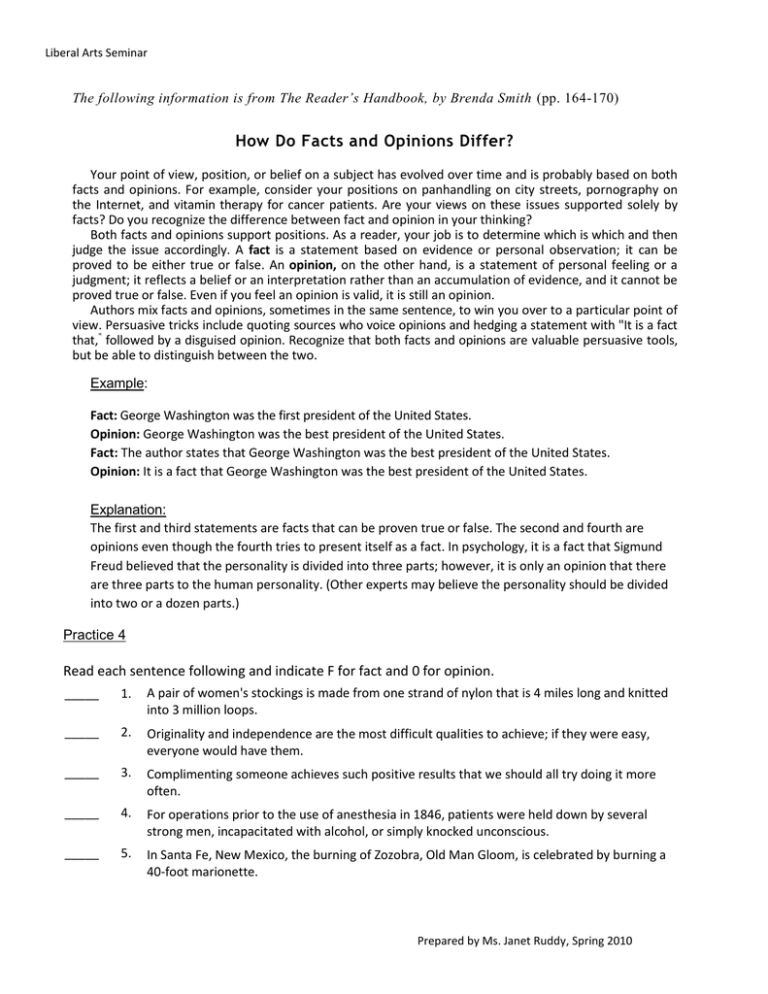
Liberal Arts Seminar
The following information is from The Reader’s Handbook, by Brenda Smith (pp. 164-170)
How Do Facts and Opinions Differ?
Your point of view, position, or belief on a subject has evolved over time and is probably based on both
facts and opinions. For example, consider your positions on panhandling on city streets, pornography on
the Internet, and vitamin therapy for cancer patients. Are your views on these issues supported solely by
facts? Do you recognize the difference between fact and opinion in your thinking?
Both facts and opinions support positions. As a reader, your job is to determine which is which and then
judge the issue accordingly. A fact is a statement based on evidence or personal observation; it can be
proved to be either true or false. An opinion, on the other hand, is a statement of personal feeling or a
judgment; it reflects a belief or an interpretation rather than an accumulation of evidence, and it cannot be
proved true or false. Even if you feel an opinion is valid, it is still an opinion.
Authors mix facts and opinions, sometimes in the same sentence, to win you over to a particular point of
view. Persuasive tricks include quoting sources who voice opinions and hedging a statement with "It is a fact
that," followed by a disguised opinion. Recognize that both facts and opinions are valuable persuasive tools,
but be able to distinguish between the two.
Example:
Fact: George Washington was the first president of the United States.
Opinion: George Washington was the best president of the United States.
Fact: The author states that George Washington was the best president of the United States.
Opinion: It is a fact that George Washington was the best president of the United States.
Explanation:
The first and third statements are facts that can be proven true or false. The second and fourth are
opinions even though the fourth tries to present itself as a fact. In psychology, it is a fact that Sigmund
Freud believed that the personality is divided into three parts; however, it is only an opinion that there
are three parts to the human personality. (Other experts may believe the personality should be divided
into two or a dozen parts.)
Practice 4
Read each sentence following and indicate F for fact and 0 for opinion.
_____
1.
A pair of women's stockings is made from one strand of nylon that is 4 miles long and knitted
into 3 million loops.
_____
2.
Originality and independence are the most difficult qualities to achieve; if they were easy,
everyone would have them.
_____
3.
Complimenting someone achieves such positive results that we should all try doing it more
often.
_____
4.
For operations prior to the use of anesthesia in 1846, patients were held down by several
strong men, incapacitated with alcohol, or simply knocked unconscious.
_____
5.
In Santa Fe, New Mexico, the burning of Zozobra, Old Man Gloom, is celebrated by burning a
40-foot marionette.
Prepared by Ms. Janet Ruddy, Spring 2010
Liberal Arts Seminar
What Is the Author's Purpose?
Authors write with a particular purpose or intent in mind, and usually that purpose is to inform, persuade, or
entertain. You might be instructed to write a paper on environmental pollution with the purpose of inspiring
classmates to recycle. In writing the paper, you must both inform and persuade. Your overriding goal,
however, is persuasion—you want to change minds, convince classmates to recycle, and move them to
action. Therefore, you will use only those facts that support your argument. Your classmates will then carefully
evaluate your scientific support, recognizing that your primary purpose was persuasion rather than
education, and decide whether to recycle all or some combination of the paper, glass, aluminum, and plastic
they toss out.
EXAMPLE: For each of the following statements, decide whether the main purpose is to inform (I), to
persuade (P), or to entertain (E).
1.
During a panic attack, the first symptoms are adrenaline and heart rate increases, followed by
breathlessness, chest pains, sweating, shaking, dizziness, and extreme feelings of anxiety.
2.
Only a sophisticated duck would walk into a bar and tell the bartender to put the drink on his
bill.
3.
Clean up before your guests arrive to show respect. Put all dishes in the washer, hang up
clothes, and discard trash. Your guests will appreciate your efforts.
EXPLANATION
The purpose of the first sentence is to inform or educate with a description of symptoms. The purpose of
the second sentence is to entertain by making a play on words for a joke. The purpose of the last sentence is
to persuade by offering advice for making house guests comfortable.
Reader's TIP
Recognizing the Author's Purpose
The three common purposes for writing are:
To inform
Authors use facts to inform, to explain, to educate, and to enlighten. The purpose of
textbooks is usually to inform or explain, but some-times an author might venture
into persuasion, particularly on topics like smoking or recycling.
To persuade
Authors use a combination of facts and opinions to persuade, to argue, to
condemn, and to ridicule. Editorials in newspapers are written to argue a point
and persuade the reader.
To entertain
Authors use fiction and nonfiction to entertain, to narrate, to describe, and to
shock. Novels, short stories, and essays are written to entertain. Sometimes an author
may adopt a guise of humor to entertain or to achieve a special result.
Prepared by Ms. Janet Ruddy, Spring 2010
Liberal Arts Seminar
PRACTICE 5
Identify the main purpose of each statement: to inform (I), to persuade (P), or to entertain (E).
___
1.
Off-shore oil drilling platforms may be beneficial to oil companies, but they threaten coastal
residents and the natural habitat of sea creatures. The oil industry can determine its profits and
losses in dollars, but the potential cost to the coastline and its inhabitants cannot be measured.
___
2.
Infrared satellite photographs offer clues to locations of significant oil reserves by detecting rocks
containing manganese and chromium. The long-distance views provided by satellites can also
reveal faults and other geological phenomena that indicate what might lie beneath the surface.
___
3.
Work on the oil rig was harder than Ricardo had ever imagined. His back was sore, his legs and
arms ached, and the 12-hour days seemed to go on forever under the late summer sun. He
wanted to be away from the ocean, away from the clank of metal on metal, and away from the
grinding sound of the engines that never stopped.
___
4.
Times Square was named for the headquarters of the New York Times, which ran news headlines
in electric lights across the top of its building.
___
5.
When first playing golf with President Clinton, Michael Jordan said, "Let's play for taxes."
___
6.
Again and again, shareholders are left with stocks of declining value, while the incompetent CEO
walks away with mil-lions. Executive compensation plans in corporate America need to be
changed.
___
7.
Do not pay millions of dollars to clone your cat and expect an exact copy. Wait for scientists to
investigate a possible genetic basis for intelligence and temperament.
___
8.
Napoleon was just five feet, six inches tall, which was the average height for Frenchmen in those
days.
W h a t Is the Author's Tone?
The tone of an author's writing is similar to the tone of a speaker's voice. For listeners, it is fairly easy to tell
the difference between an angry, joyful, or romantic tone on hearing the speaker's voice. For an example of
how tone in writing can vary, pretend you are waiting for a friend who is already a half-hour late. You can
wait no longer, but you can leave a note. On your own paper, write your friend three different messages—
one with a sympathetic tone, one with an angry tone, and one with a sarcastic tone. What would determine
which message you would actually leave?
Detecting extremes such as anger and joy is easier than distinguishing among more sophisticated attitudes
such as humor, sarcasm, and irony. Humorous remarks are designed to be comical and amusing, whereas
sarcastic remarks are designed to cut or give pain. Ironic remarks sometimes express the exact opposite of
what the words state. Noting these differences requires more than just listening to sounds; it requires a
careful evaluation of what is said. Because the sound of the voice is not heard in reading, clues to the tone
must come from the writer's presentation of the message. Your job is to look for clues to answer the question
What is the author's attitude toward the topic?
Prepared by Ms. Janet Ruddy, Spring 2010
Liberal Arts Seminar
Reader’s TIP
Recognizing the Author's Tone
The following words, listed with their meanings, can describe an author's tone or attitude.
Absurd, farcical, ridiculous: laughable or a joke
Ambivalent, apathetic, detached: not caring
Angry, bitter, hateful: feeling bad and upset about the topic
Arrogant, condescending: acting conceited or above others
Awestruck, wondering: filled with wonder
Cheerful, joyous, happy: feeling good about the topic
Compassionate, sympathetic: feeling sorrow at the distress of others
Congratulatory, celebratory: honoring an. achievement or festive occasion
Cruel, malicious: mean-spirited
Cynical: expecting the worst from people
Depressed, melancholy: sad, dejected, or having low spirits
Disapproving: judging unfavorably
Evasive, abstruse: avoiding or confusing the issue
Formal: using an official style
Frustrated: blocked from a goal
Gentle: kind, or of a high social class
Hard: unfeeling, strict, and unrelenting
Humorous, jovial, comic, playful, amused: being funny
Incredulous: unbelieving
Indignant: outraged
Intense, impassioned: extremely involved, zealous, or agitated
Ironic: the opposite of what is expected; a twist at the end
Irreverent: lack of respect for authority
Mocking, scornful, caustic, condemning: ridiculing the topic
Objective, factual, straightforward, critical: using facts without emotions
Obsequious: fawning for attention
Optimistic: looking on the bright side
Outspoken: speaking one's mind on issues
Pessimistic: looking on the negative side
Prayerful: religiously thankful
Reticent: shy and not speaking out
Reverent: showing respect
Righteous: morally correct
Romantic, intimate, loving: expressing love or affection
Sarcastic: saying one thing and meaning another
Sensational: overdramatized or overhyped
Sentimental, nostalgic: remembering the good old days
Serious, sincere, earnest, solemn: being honest and concerned
Straightforward: forthright
Subjective, opinionated: expressing opinions and feelings
Tragic: regrettable or deplorable mistake
Uneasy: restless or uncertain
Vindictive: seeking revenge
Source: Smith, Brenda. The Reader’s Handbook: Reading Strategies for College and Everyday Life. 3rd ed. New York:
Pearson Longman, 2007.
Prepared by Ms. Janet Ruddy, Spring 2010

